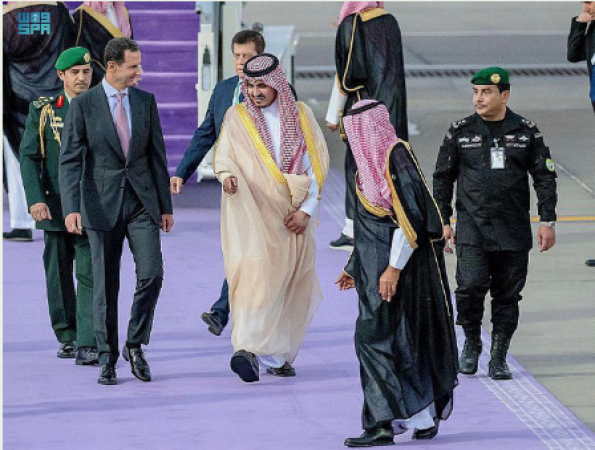
Irbil: A delegation from Syria led by President Bashar Assad attended the 32nd summit, which was held in the Saudi city of Jeddah, thirteen years after he had previously attended a significant Arab League gathering.
Following Syria's readmission into the pan-Arab organisation earlier this month and amid broader Saudi-led efforts to mend relations between Damascus and other Arab nations, Assad will attend the summit on Friday.
In his Wednesday speech to attendees of a summit preparation meeting, Saudi Foreign Minister Prince Faisal bin Farhan Al-Saud adopted a decidedly accommodative tone. He stated that while "we welcome the return of Syria to the Arab League," it is crucial to create new mechanisms to address "the challenges facing us."
Also Read: Zelensky from Ukraine arrives in Hiroshima, Japan, for "talks with friends."
Both Saudi Arabia and Syria intend to resume diplomatic activities and flight operations. Although Saudi Arabia, which severed ties with the Assad regime in 2012, is not the first Arab nation to rebuild ties with Syria, it is leading the current diplomatic initiative, which many analysts believe has the potential to have a significant impact.
According to Ryan Bohl, a senior Middle East and North Africa analyst at the risk intelligence firm RANE, "I think Saudi Arabia played the role of 'normalising' normalisation," he told Arab News. "Countries like Egypt, the UAE, and Bahrain were already pushing for normalisation, but without Saudi support they all seemed like outliers.
Riyadh's support for normalisation, he claimed, "helped accelerate the trend" as the largest Gulf Arab state with significant political and economic sway in the area. "The majority of the advantages are long-term in nature. Saudi Arabia gains in the short term from having the image of being a mediator who uses diplomacy to settle disputes.
Bohl anticipates that in the "longer run," the Kingdom will aid in starting the reconstruction of Syria and "play a major role in rebuilding the country and potentially building up influence there."
Syria is now on the "path of potentially gaining some sort of new economic ties with the outside world" as a result of diplomatic normalisation and regional recovery, which may help to kickstart much-needed reconstruction and reopened trade.
The Assad government's crackdown on protests that started earlier that year and turned into a war that has killed more than 500,000 people, displaced millions of people, and devastated the nation's infrastructure and industry led to the Arab League suspending Syria in November 2011.
Also Read: Philippines extradites suspected Sikh separatists to India
"The Saudi role has been essential for Syria's return to the Arab world's heart," Joshua Landis, director of the University of Oklahoma's Farzaneh Family Centre for Iranian and Arabian Gulf Studies and the Centre for Middle East Studies,
Crown Prince Mohammed bin Salman's goal of "turning the Kingdom into a business and tourist hub" for the region will be realised with the aid of Saudi Arabia's push for stability and economic growth in the Middle East.
"Rebuilding Syria is essential to creating a better, more stable and prosperous region," he said.
Landis thinks that the Syrian action will help to achieve the objective of "cementing Saudi Arabia's role as the leader of the Arabs and the larger Middle East."
There is no reason not to reach an agreement with Yemen and Syria, Landis said, "now that the Saudi leadership has reached an understanding with Iran." "Saudi Arabia wins,'" one person said.
The Jeddah summit is one of the possible outcomes, according to both analysts. According to Bohl of RANE, "I believe it will be one of several events that will be significant." "At this point, there is only a limited amount of normalisation Syria can achieve among its former adversaries.
Landis, on the other hand, characterised the occasion as significant "even though the Arab League has been known for its insignificance."
A majority of Middle Eastern countries' normalisation of relations with Syria could also help to improve the domestic humanitarian situation and even bring back levels of stability not seen in more than ten years.
Humanitarian aid for areas affected by the earthquakes in February and in rebel-held territory will be made easier by normalisation, according to Bohl. "By encouraging rebel groups to make concessions to Damascus, it could hasten some of the reconciliation agreements required to see a peaceful end to the civil war. It might also serve as a warning to Washington that the parameters and duration of its mission in Syria need to be clarified.
But both analysts agree that there are still big problems and barriers to overcome. The US continues to oppose removing its sanctions against Syria. Landis calls those sanctions the "great barrier" to Syria's reconstruction.
Arab nations will now need to decide how to erode Western sanctions and resist the West's efforts to uphold a strict boycott of Syria, he said.
Also Read: Police in Australia are withholding the video of a 95-year-old being tasered
The first step towards stabilising Syria and reviving its economy—which has been severely paralysed by more than a decade of civil war and sanctions—is readmission into the Arab League. The procedure was described by Landis as a "humble beginning."
The ability of the Arab League and Saudi diplomacy to convince the West to relax its sanctions and make it easier to resume trade and restore Syria's energy sector and electrical grid will be the real test, according to him. Syrians will continue to suffer and live in poverty until that happens.